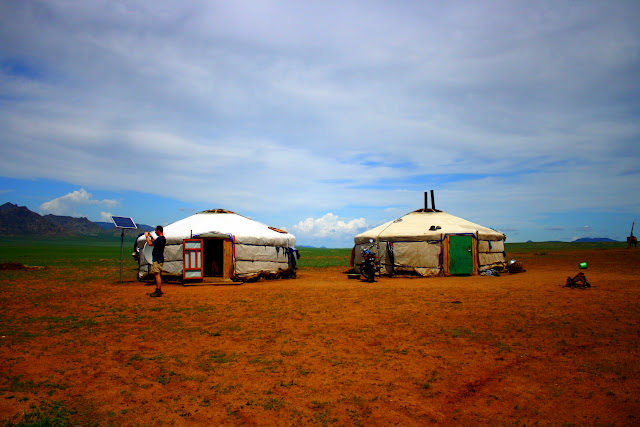The fantasy of living with nomads starts with a single step... and a bumpy jeep ride to the middle of nowhere.
 |
| Home for the next two nights. |
 |
| And the horses... the sheep and goats are out to pasture. |
The first night I had the company of a Dutch guy who was doing a similar circuit... he was leaving after only a couple of nights though, while I was in for the long haul.
I have a theory that to really experience something you almost have to do it long enough for it to be familiar, and for you to get sick of it. After two or three nights, who knows, maybe I would still be hungry for more. But I was pretty sure that after 2 weeks in the boonies I was either going to really, really love Mongolia, or, more likely, be about ready to come home.
So this was day one of twelve.
As would happen over and over again during the trip, it was the kids that really brought the experience together. As adults we get more reserved, more shy, and more afraid of breaking social taboos. Kids don't care about any of that stuff, and they also tend to be really good at reading subtle clues, like body language or hand gestures, to figure out what's going on.
Our little guide this time around was Badzar ("thunderbolt"). He was probably about 10 years old. In the States, we'd also probably say the kid has ADD, but out here it seemed like he was just an energetic kid out in the countryside. He was obviously pretty proud of his zombie impression (see below), which he used to pretty good effect with every group of tourists, I'm guessing.
Getting settled included a little
airag, which is fermented mares milk. If it sounds like an acquired taste, well, it is, but if you insist and work at it, it can actually be pretty good. The alcohol, about 1-2% by volume, keeps it from spoiling and helps napping during the hot afternoons.
Unfortunately for the authenticity of our trip, most of the families, including this one, had substituted the pure meat and dairy diet for some Western imports, including noodles, potatoes and rice. I guess past groups had complained, but those additions aren't supposed to be part of the culture. And the food was... basic, I guess, but nothing a little hot sauce couldn't handle (luckily I found a huge bottle at a grocery store in UB!).
The first thing I noticed about nomad / herder lifestyle was just how slow the days go by. There's an early morning push to get the sheep, goats and cattle out to pasture, but then there's just a long, hot day of hanging out waiting, waiting and waiting. People keep busy mashing the
airag, or maybe doing laundry, but it's a lot of sitting around, staring at the sky, and now with solar panels - watching TV. So much for the aggressive imagery of people on horses looking like heroes - well, there's that too, but it's as much a part of Mongolian life as crazy fraternity parties are part of life for the average American.
I brought a couple of heavy tombs to read (prepping for China), so I was prepared... at least for a little while.





















































